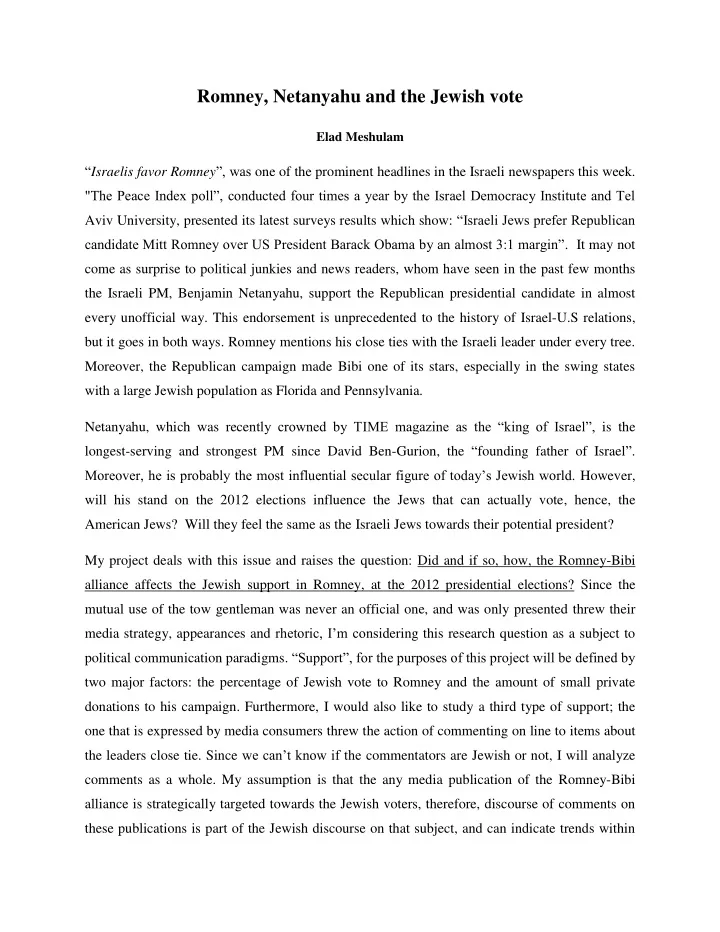

Romney, Netanyahu and the Jewish vote Elad Meshulam “ Israelis favor Romney ”, was one of the prominent headlines in the Israeli newspapers this week. "The Peace Index poll”, conducted four times a year by the Israel Democracy Institute and Tel Aviv University, presented its latest surveys results which show: “Israeli Jews prefer Republican candidate Mitt Romney over US President Barack Obama by an almost 3:1 margin” . It may not come as surprise to political junkies and news readers, whom have seen in the past few months the Israeli PM, Benjamin Netanyahu, support the Republican presidential candidate in almost every unofficial way. This endorsement is unprecedented to the history of Israel-U.S relations, but it goes in both ways. Romney mentions his close ties with the Israeli leader under every tree. Moreover, the Republican campaign made Bibi one of its stars, especially in the swing states with a large Jewish population as Florida and Pennsylvania. Netanyahu, which was rece ntly crowned by TIME magazine as the “king of Israel”, is the longest-serving and strongest PM since David Ben-Gurion, the “ founding father of Israel ” . Moreover, he is probably the most influential secular figure of today’s Jewish world. However, will his stand on the 2012 elections influence the Jews that can actually vote, hence, the American Jews? Will they feel the same as the Israeli Jews towards their potential president? My project deals with this issue and raises the question: Did and if so, how, the Romney-Bibi alliance affects the Jewish support in Romney, at the 2012 presidential elections? Since the mutual use of the tow gentleman was never an official one, and was only presented threw their media strategy, appearances and rhetoric, I’m consid ering this research question as a subject to political communication paradigms . “Support”, for the purposes of this project will be defined by two major factors: the percentage of Jewish vote to Romney and the amount of small private donations to his campaign. Furthermore, I would also like to study a third type of support; the one that is expressed by media consumers threw the action of commenting on line to items about the leaders close tie. Since we can’t know if the commentators are Jewish or not, I will analyze comments as a whole. My assumption is that the any media publication of the Romney-Bibi alliance is strategically targeted towards the Jewish voters, therefore, discourse of comments on these publications is part of the Jewish discourse on that subject, and can indicate trends within
the Jewish opinion and even influence it. In order to analyze the measure of voters’ “support” in the public discourse as much as possible, I chose to look at the talkbacks as my unit of analysis, and not the headlines, images or texts. In this project I’ll present three hypotheses. The first one is regarding to the actual vote; since 1916 Jewish voters have supported democratic candidates, who received an average of 70% of the Jewish votes. (There is an old joke saying that Jews earn like Episcopalians and vote like Puerto Ricans.) This phenomenon drives me to assume that even if Obama’s turnout among Jewish voters will go down from the 2008 results, we will not see a more substantial decrease than the one of the general population in the support for him. The second hypothesis is that we may see a larger amount of small private Jewish donation to the Romney’s campaign. According to recent polls, 80% of the Jewish voters who made financial contribution in 2008, to both parties, are willing to do so in 2012 as well. However, this information does not give us the sense of the figures.in order to check our assumption we should wait for final reports. Both of these hypotheses will be analyzed threw the official data and the wide Jewish polls that will show the percentage of vote and amounts of money donations. In order to find the correlation, I will also use our class survey, in which I will ask Jewish participants how aware they were of the Romney-Bibi alliance, and what importance did it make in their voting decision. In addition, to strength the correlation, I will use a wider Jewish poll that questions: what issues are most important to Jewish voters when deciding their vote. Recent polls of this kind had shown that U.S-Israel relations, and Israeli issues in general, comes only around the seventh place in the list of Jewish voters priority’s. This data makes me better believe in my assumption for a correlation. The third hypotheses in this project, is that the use of the Romney-Bibi alliance will arouse more supportive discourse threw comments and talkbacks in online Jewish media. I will research this assumption using content analysis methods in the most popular stories regarding the “ alliance ” , from the date of the first convention to the date following the last presidential debate. Since the cost of this support and type of participation is much lower than actual voting or donating, I expect to find a better result favoring Romney, than the percentage of vote and amount of donations from Jewish voters. Clearly, analyzing online comments cannot fully reflect a supportive or unsupportive discourse; however, I do believe it is a litmus test that gives us a
sense of Jewish voters’ thoughts, and the can show success of the use of the “alliance” in the republican media strategy and campaign.
Recommend
More recommend